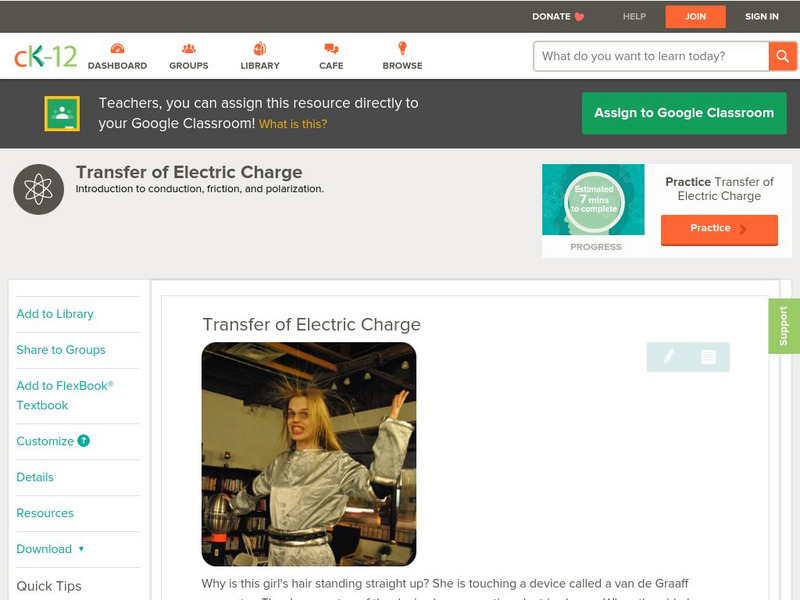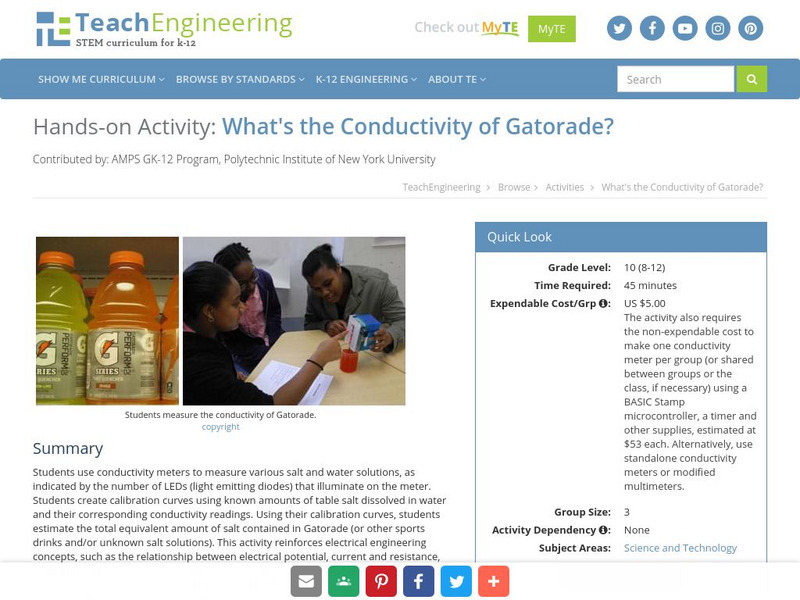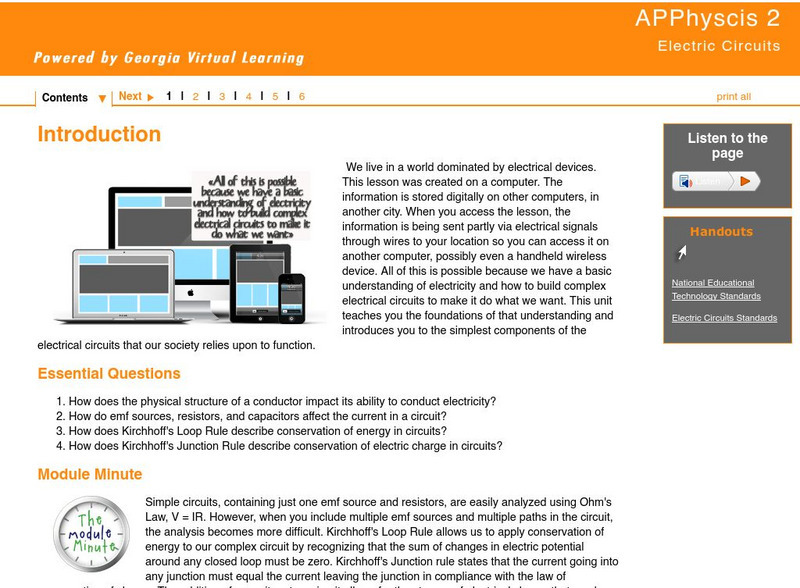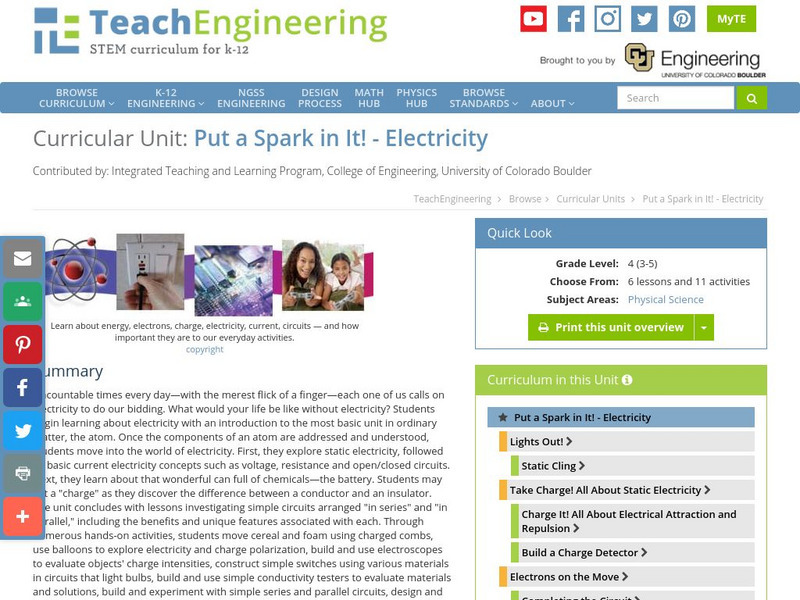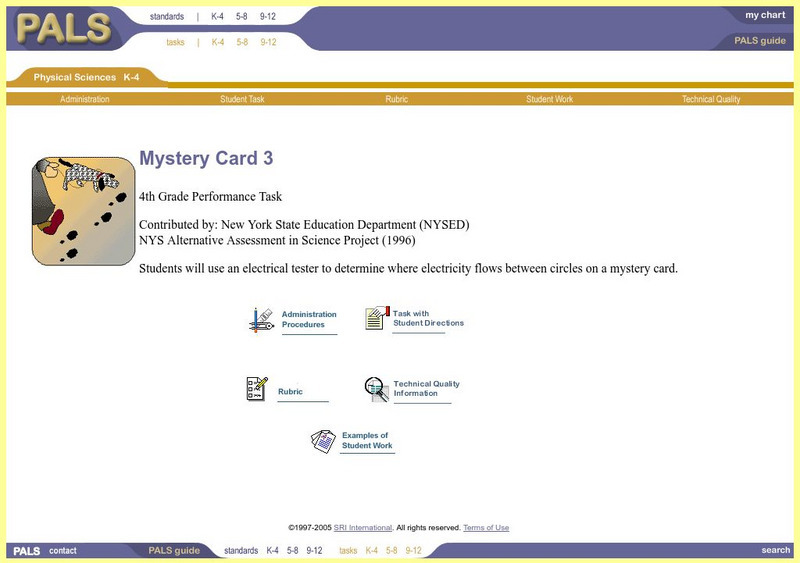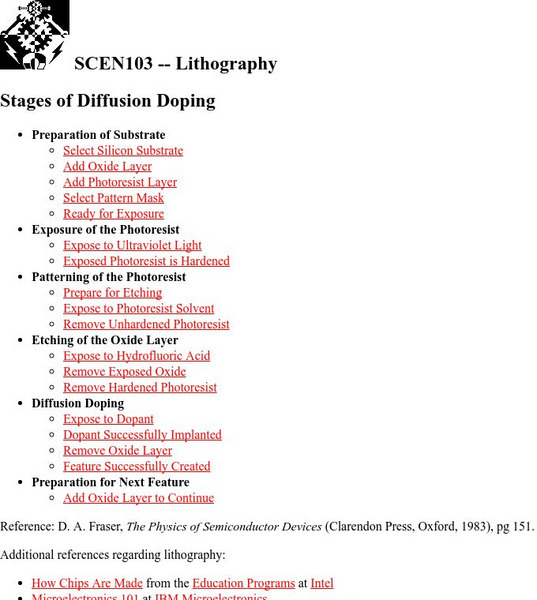Hi, what do you want to do?
Curated OER
Marconi and the Radio: Reading Comprehension
In this reading comprehension worksheet, students read a selection, then complete 7 multiple choice questions. Students may click on an answer button for immediate feedback. Worksheet is labeled ESL, but is not exclusive.
Curated OER
Am I Sticky
Fourth graders become familiar with magnets and their properties. They investigate what items are magnetic and non-magnetic and make generalizations about the properties. They utilize technology to develop an interactive digital book.
Curated OER
OHM's Law
Students study the relationship between current, voltage and resistance in a series circuit. In this investigative lesson students watch a demonstration and see how voltage is measured and see what OHM's law is.
Curated OER
Mining Reclamation Research Project
Students work together in groups to research a different mining reclamation project. Using the internet, they answer specific questions to the one area they are to focus on. They use the information they gathered to create a PowerPoint...
CK-12 Foundation
Ck 12: Physical Science: Transfer of Electric Charge
[Free Registration/Login may be required to access all resource tools.] Transfer of electric charge: transfer of electrons, conservation of charge and three ways electric charge can be transferred.
TeachEngineering
Teach Engineering: What's the Conductivity of Gatorade?
Students use conductivity meters to measure various salt and water solutions, as indicated by the number of LEDs (light emitting diodes) that illuminate on the meter. Students create calibration curves using known amounts of table salt...
Science Education Resource Center at Carleton College
Serc: Conductivity of Water
Students discover that pure water does not conduct electricity and that dissolving different substances in water may or may not cause it to conduct electricity.
Georgia Department of Education
Ga Virtual Learning: Ap Physics 2: Electric Circuits
This unit teaches students the foundations of electrical circuits and introduces them to their simplest components. Covers series and parallel circuits, Kirchhoff's Rules, Ohm's Law, RC circuits, resistivity, and capacitance.
TeachEngineering
Teach Engineering: Will It Conduct?
Students build their own simple conductivity tester and explore whether given solid materials and solutions are good conductors of electricity.
Canada Science and Technology Museum
Canada Science and Technology Museum: Background Information for Electricity
The Canada Science and Technology Museum answers some of the most common questions about electricity. For example, get the definition of electricity, the difference between alternating and direct currents, and learn how a fuse works.
TeachEngineering
Teach Engineering: Put a Spark in It! Electricity
Uncountable times every day "with the merest flick of a finger"each one of us calls on electricity to do our bidding. What would your life be like without electricity? Students begin learning about electricity with an introduction to the...
SRI International
Performance Assessment Links in Science: Mystery Card 3
Straightforward introduction to electrical circuits using minimal materials and time. Students learn about the basics of electrical circuits by experimenting with "mystery cards" -- index cards with hidden aluminum foil used to conduct...
American Geosciences Institute
American Geosciences Institute: Earth Science Week: Mineral Electrical Conductivity
The purpose of this activity is to test the conductivity of various minerals with a simple electrical circuit and draw conclusions about which ones would be used in electronics.
Other
Bsi Education: Electrical Properties
The Applied Science resource consists of practical activities that demonstrate the importance of standard procedures in scientific work. Students examine electrical properties through a variety of activities. Some topics investigated are...
TeachEngineering
Teach Engineering: Conductivity
Students make a simple conductivity tester using a battery and light bulb. They learn the difference between conductors and insulators of electrical energy as they test a variety of materials for their ability to conduct electricity.
University of Colorado
University of Colorado: Ph Et Interactive Simulations: Band Structure
Explore the origin of energy bands in crystals of atoms. The structure of these bands determines how materials conduct electricity. Java required.
TeachEngineering
Teach Engineering: Saltwater Circuit
Students build a saltwater circuit, which is an electrical circuit that uses saltwater as part of the circuit. Students investigate the conductivity of saltwater, and develop an understanding of how the amount of salt in a solution...
Pennsylvania State University
Applied Physics: Model Analysis of an Electric Guitar
Great site explores the physics behind an electrical guitar. Outlines process for conducting an experiment on sound vibrations and provides animated GIF movies showing the first five modes of vibration.
National High Magnetic Field Laboratory
Magnet Academy: Joseph John Thomson
Joseph John Thomson, better known as J. J. Thomson, was a British physicist who first theorized and offered experimental evidence that the atom was a divisible entity rather than the basic unit of matter, as was widely believed at the...
Physics Classroom
The Physics Classroom: Static Electricity: Charging Interactive
Explore charge interactions, the charging of objects by conduction and induction, and the grounding of objects in this interactive.
University of St. Andrews (UK)
University of St. Andrews: Insulators
The nature of insulators is described at the atomic level. Band gap theory is used to explain what distinguishes insulators from conductors.
Science Education Resource Center at Carleton College
Serc: Investigating Testing for Electrical Conductivity Using Materials
In this activity, students will understand that electricity moves through different circuits and discover what types of materials are conductors and insulators.
Other
University of Delaware Physics Department: Lithography
University of Delaware Physics Department provides this indexing page for a slide show presentation.
Other
Univ. Of Delaware Physics: More Semiconductor Physics
The University of Delaware Physics Department provides this site from a site titled "Silicon, Circuits, and the Digital Revolution," here is a series of four pages which explain the details behind how semiconductors work. An introduction...









